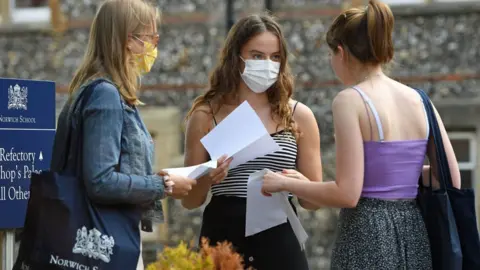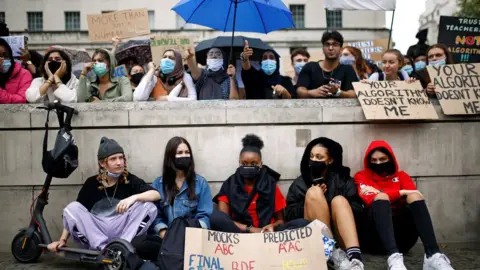Exam results: Where did it go wrong and what happens next?
 PA Media
PA MediaExam results days are often likened to a roller-coaster ride, but this year the highs and lows have been something else.
Straight A pupils were given A-level grades befitting those in bottom sets, and how well teenagers could perform was defined by those who attended their schools before them.
Once Scotland's first minister Nicola Sturgeon ditched her nation's standardisation model, it was arguably only a matter of time before the other nations followed suit.
Cue the domino effect: Northern Ireland reinstated teacher-assessed grades, then Wales, and finally England.
These students are all competing for the same university places and are in the same jobs market after all.
So what went wrong?
For the past decade, England's exams regulator Ofqual has held the line against grade inflation like a knight of the realm.
It has been the champion of each Conservative education secretary's dutiful attempt to introduce ever more rigour and challenge into the system.
GCSEs were toughened, "low value" vocational courses were scrapped, and on no account were students to be given an easy ride.
If Tony Blair's mantra was "education, education, education", the Conservative mantra has been "rigour, rigour, rigour".
But in the case of the class of Covid, the preoccupation with maintaining standards came at too high a price.
In commissioning the exams regulator to take out an insurance policy in the form of its ill-fated algorithm, its desire to cap grade inflation went too far.
'Tearing hair out'
Education Secretary Gavin Williamson insists he was given lots of assurances by the regulator that its method of adjusting the teacher-assessed grades was fair.
But when he and his deputy Nick Gibb - who has been the driving force of education reform at the DfE over the past decade - saw how grammar school pupils and further education college students were adversely affected alike, they really had no choice but to act.
Leading academics described how teachers were "tearing their hair out" in schools, trying to help their pupils wade through an appeals system which was changing every few days.
 Reuters
ReutersPerhaps a new wave of Covid-inspired empathy broke out for the students who were sent home instead of being allowed to take the exams that were meant to be the crowning glory of their school careers.
It was clear they actually wanted to sit the exams cancelled by lockdown rather than dodge them.
"How can we fail exams we haven't even taken?" was the cry.
What happens next?
It's a bit messy to say the least.
According to the former head of Universities and College Admissions Service (Ucas), Mary Curnock Cook, there are about 55,000 students who have either accepted second choice offers or got a university place through the Clearing system which matches students with unfilled places.
But when universities make a conditional offer and the pupil obtains those grades, the university is legally required to provide them with a place on that course.
Because places have been allocated on the earlier adjusted results, there will more qualified students than places available, however.
Mr Williamson has now confirmed that the strict limit on university places which was reintroduced will be removed, but it's not clear whether universities will be able to accommodate everyone entitled to a place.
The Russell Group of leading universities said it had already accepted many students who had narrowly missed out on their grades, but it was not sure if they would be able to stretch resources to meet the needs of everyone.
Ucas said nearly 70% of 18-year-olds had already got a place at their first choice university - but what of those who have not?
"Once your university has your centre-assessed grades via exam bodies they can make a decision as to whether there is a place at your first preferred choice," it added.
That does not sound like much of a guarantee.
For example, the University of Reading has already said it will not be able to give places to everyone with the right grades on all of its courses. This particularly refers to some courses which have restrictions in capacity, for example pharmacy-related courses.
On the up side, GCSE pupils are likely to get record results on Thursday thanks to the reinstatement of teacher-assessed grades.
